


D. Kneeland and T. Vahanen
Douglas Kneeland is Chief of the Forestry Information and Liaison Service, FAO Forestry Department, Rome, and Secretary of COFO.
Tiina Vahanen is Forestry Officer, FAO Forestry Department, Rome.
The opening session of the Ministerial Meeting on Forests |
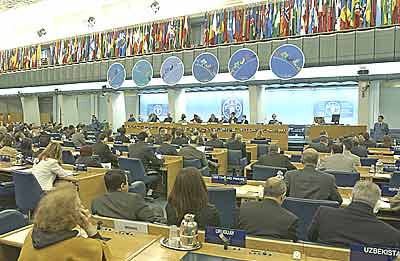 |
FAO/I. BALDERI |
Practical intergovernmental dialogue provides the stimulus for important initiatives in the forest sector and supports national-level action.
Do global meetings accomplish anything? This is one of the most debated questions in international forestry. Increasingly, participants in the international forest policy dialogue are calling for “less talk and more action”. Some are asking if the money spent on global meetings could be better spent elsewhere.
Looking back, however (see Figure), it is clear that intergovernmental processes have provided the stimulus for a number of important initiatives in the forest sector. For example, the Intergovernmental Panel on Forests (IPF) Proposals for Action initiated in 1995 included support for national forest programmes, national-level criteria and indicators for sustainable forest management and improved national and global forest resource assessments (ECOSOC, 1997).
Significant progress has been made in each of these areas in the intervening ten years. There is evidence that many countries are turning the corner towards sustainable forest management, thanks in part to these initiatives. It is not a coincidence that the biggest “success stories” have been initiatives that provide support to national-level action. Countries are responsible for their forest resources – this is the underlying concept of the “Forest Principles” agreed at the United Nations Conference on Environment and Development (UNCED), and this basic idea has been reinforced during the subsequent years.
Yet many participants and observers are suggesting that momentum is fading and that large global meetings are losing contact with the real problems facing forestry, politicizing every issue and spending too much time on procedural matters. It was therefore with some trepidation that FAO made plans for the third FAO Ministerial Meeting on Forests and the seventeenth session of the Committee on Forests (COFO) in Rome in March 2005.
It had been six years since FAO had hosted a Ministerial Meeting on Forests. Were forests slipping from the international radar screen? Increased attention is being paid to the development goals that emanated from the Millennium Assembly of the United Nations (the “Millennium Summit”), known as the Millennium Development Goals (MDGs) (see www.un.org/millenniumgoals) – but the important contributions that forests can make in achieving these goals are not widely understood.
FAO was convinced that a high-level meeting on forests in early 2005 would help to mobilize political commitment for sustainable forest management at a critical time. The fifth session of the United Nations Forum on Forests (UNFF) is scheduled to take place in late May 2005 in New York (see www.un.org/esa/forests). The hope was that the Rome and New York events might constitute a “one-two punch” that would generate publicity for forests, and more importantly, help to get high-level political figures to pay more attention to the vital role of forests in sustainable development.
If participation at the two meetings hosted by FAO from 14 to 19 March 2005 is any indication, then it appears that they had the desired effect: 700 delegates registered for COFO, compared with 420 in 2003. More than 630 country delegates (including 90 heads of national forest organizations) and more than 60 representatives of non-governmental organizations (NGOs), international organizations and the private sector gathered in Rome for six days of intensive discussions about current forest issues related to fire, MDGs, economic aspects, conflicts and information, among others.
In addition to the formal debates in plenary, COFO featured 19 side events on a wide range of technical and policy topics (see Box). Many of these information-sharing sessions were organized by FAO’s partners including member organizations of the Collaborative Partnership on Forests (CPF), NGOs and the private sector. These sessions provided an opportunity for open discussion outside the formal agenda; they helped stimulate new ideas and generate new requests for FAO technical work.
A new feature was a meeting where civil society groups were invited to provide their views on FAO’s work in forestry and on the roles of civil society in sustainable forest management (see Box). The Civil Society Meeting, held immediately prior to the Ministerial Meeting and COFO, also discussed opportunities for enhancing collaboration between FAO and civil society entities for mutual benefit.
The reports and background documents, in FAO’s five official languages, are posted on the FAO Web site (www.fao.org/forestry). Daily coverage of the events was published online by the Earth Negotiations Bulletin (www.iisd.ca/FAO/COF17).
Three key mechanisms for translating talk into action were emphasized:
What is COFO? The Committee on Forestry (COFO) is the most important of FAO’s statutory bodies in forestry (others include the Regional Forestry Commissions, the Advisory Committee on Paper and Wood Products, the Committee on Mediterranean Forestry Questions – Silva Mediterranea, the International Poplar Commission and the Panel of Experts on Forest Gene Resources). The biennial sessions of COFO, held at FAO headquarters, bring together heads of forestry services and other senior government officials to identify emerging policy and technical issues, seek solutions and advise FAO and others on appropriate action. Participation in COFO is open to all FAO member countries. |
|
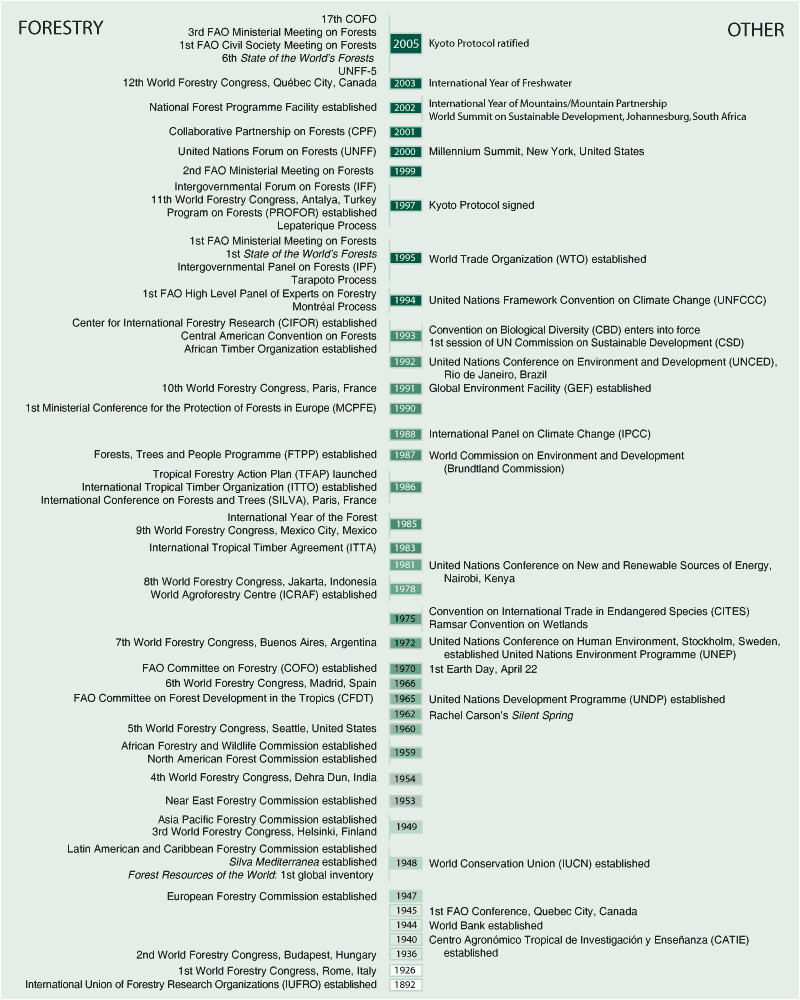 |
The COFO exhibit in the atrium at FAO headquarters highlighted forests’ contributions towards meeting the Millennium Development Goals |
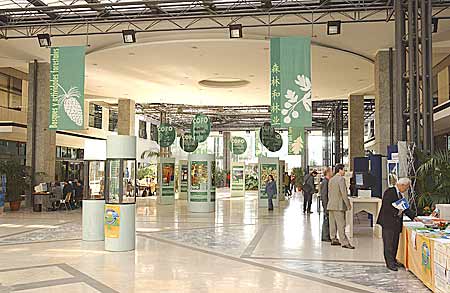 |
FAO/I. BALDERI |
The Ministerial Meeting on Forests, held on 14 March 2005, was attended by almost 50 Ministers, Vice-Ministers or equivalent. The meeting was co-chaired by Elliot Morley, Minister for Environment of the United Kingdom, and Carlos Manuel Rodríguez, Minister for Environment and Energy of Costa Rica.
In his opening address, FAO Director-General Jacques Diouf called on the ministers to strengthen international cooperation on forest fire management and highlighted FAO’s contribution to the implementation of international commitments relating to sustainable forest management. The President of the Republic of the Congo, Denis Sassou Nguesso, addressed the gathering, calling for increased political commitment to sustainable forest management especially in the Congo Basin.
The Ministerial Meeting on Forests addressed three items:
In considering action that could be taken to address these key issues, the statement adopted by ministers and senior officials from 126 countries and the European Community (see p. 18) challenges countries:
The podium at the opening of the Ministerial Meeting on Forests: from left, FAO Assistant Director-General for Forestry M. Hosny El-Lakany; FAO Deputy Director-General David Harcharik; 2004 Nobel Peace Prize winner Wangari Maathai; FAO Director-General Jacques Diouf; Co-Chair Elliot Morley, Minister for Environment of the United Kingdom; and Secretary R. Michael Martin |
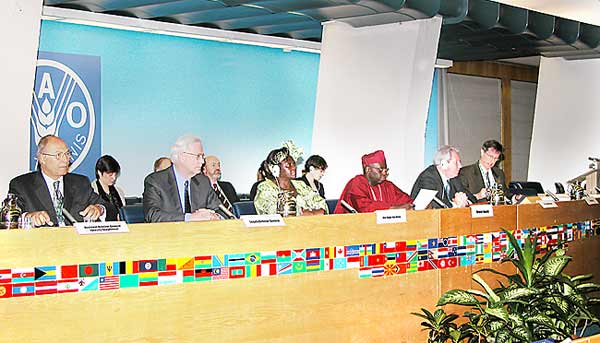 |
IISD/D. FERNAU |
COFO was chaired by Abdelazim Mirghani Ibrahim of the Sudan, with David Rhodes of New Zealand as First Vice-Chair. The other vice-chairs (one per region) represented China, Costa Rica, Finland, Mali and the United States.
Guest speakers at the opening session included the Prime Minister of Finland, Matti Vanhanen, who noted the significant contribution that forests make to national prosperity and to basic survival needs and commended FAO’s work on national forest programmes, and Wangari Maathai, 2004 winner of the Nobel Peace Prize. Maathai, recently named Goodwill Ambassador for Congo Basin forests, made a plea for assistance to the forests of Central Africa which set on the table the challenge for the rest of the week’s discussions: how to implement the recommendations made by the Ministers the day before.
The week’s discussions highlighted, among other points:
Countries emphasized the need for FAO’s programme of work to reflect forests’ role in meeting the MDGs. Linking the MDGs to forestry can support FAO’s work on poverty and local livelihoods, thematic areas emphasized at the previous session of COFO in 2003.
An in-session seminar, “Maintaining the International Commitment to Sustainable Forest Management”, provided a venue for participants, off the record, to share successful examples of sustainable forest management in their countries. Stimulating presentations were given on environmental services payments in Costa Rica, poverty alleviation through better forest management in Pakistan, securing the international commitment to sustainable forest management and the role of civil society in the formulation and implementation of national forest programmes in Uganda.
COFO also emphasized the recent revitalization of FAO’s Regional Forestry Commissions as venues for regional forest policy dialogue and recommended that they too should elevate the importance of forestry on the political agenda and emphasize forestry’s contribution to poverty alleviation and achievement of the Millennium Development Goals. It also emphasized FAO’s continuing leadership of CPF (see www.fao.org/forestry/cpf) and discussed strengthening CPF’s role in the future.
The recommendations for action to be taken by countries, Regional Forestry Commissions, FAO and key partners can be found in the report of the meeting (FAO, 2005).
Civil society consultation – 13 March 2005 For the first time in the history of the FAO Forestry Department, a one-day meeting was held with representatives of civil society to discuss the directions of FAO’s programme of work and areas for mutually beneficial collaboration. The eight civil society participants represented diverse groups: Associação Brasileira de Celulose e Papel, Confederation of European Forest Owners, Environmental Alert, International Alliance of Indigenous and Tribal Peoples of Tropical Forests, International Federation of Building and Wood Workers, International Union of Forest Research Organizations, Women Organising for Change in Agriculture and Natural Resource Management, and youth. The meeting emphasized the importance of partnerships (linking civil society with international organizations, national governments and the private sector), capacity building and communications in supporting civil society’s contribution to sustainable forest management and poverty reduction. Capacity building is needed not only to enable civil society actors (including women, youth, indigenous peoples, smallholders and forest workers) to contribute their views effectively in local planning and policy-making, but also to put into place institutional frameworks in which more structured partnerships can take place. Participants recognized FAO’s success in facilitating civil society participation in forest sector dialogue at the national level in some countries (see p. 48) and encouraged the extension of these efforts. FAO’s technical meetings and workshops now almost always include invited civil society participants. FAO has also been making a great effort to encourage increased participation of civil society in its international policy-related meetings (e.g. COFO and sessions of the Regional Forestry Commissions). Participants noted that civil society groups are regularly included in some national delegations (e.g. Canada, Finland, Kenya, the United States) to these meetings, and see this as a particularly effective way to have their views voiced. The report of the meeting was presented to COFO the following week (see www.fao.org/forestry/site/cofo/en). Major groups also made a joint statement during the Ministerial Meeting on 14 March 2005. |
Wangari Maathai and Director-General Diouf on Day 1 of COFO |
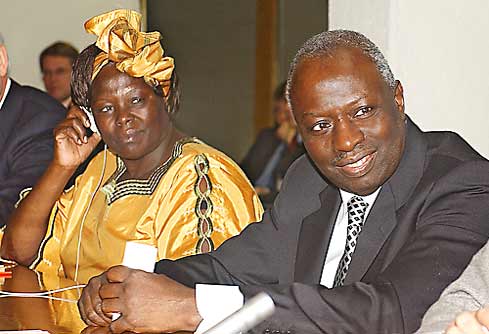 |
IISD/D. FERNAU |
2005 is the sixtieth anniversary of forestry discussions at FAO and the thirty-fourth anniversary of COFO. Literally hundreds of initiatives and programmes that made positive contributions to forestry originated in these gatherings, and in the 127 meetings of the six Regional Forestry Commissions that took place between 1947 and 2004. Many of the forestry institutions and universities in developing countries, for example, trace their beginnings to discussions in COFO or in Regional Forestry Commissions.
The nature of COFO has changed over the years, and today it provides a forum for national forestry leaders to discuss forest policy issues of international relevance and, increasingly, cross-sectoral issues. The meeting format has evolved to provide greater opportunity for informal participation and discussion in afternoon side events that do not compete with morning plenary sessions devoted to the discussion of formal agenda items. Attendance by intergovernmental organizations and international NGOs representing academia, forest owners, industry, indigenous people, youth and other civil society groups has grown. The participation of numerous ministers from developing and developed countries is evidence of an intensified political focus on forests.
The 2005 session addressed many new and emerging issues in forestry, especially the linkages between forestry and the internationally agreed development goals, including those engendered by the UN Millennium Declaration – while emphasizing the basic fact that the environmental and social benefits of forests cannot be realized without a fundamental economic base to forest management.
COFO 2005 emphasized technical as well as political matters, as evidenced in particular by the numerous side events. FAO’s marshalling of technical expertise, reinforced through partnership with other organizations (particularly CPF), together with the political commitment of member countries to FAO’s work, guarantees that FAO will be poised to complement and contribute incisively to whatever international arrangement on forests is decided at UNFF-5.
 Bibliography
Bibliography
FAO. 2005. Committee on Forestry, seventeenth session – Report. Rome, Italy, 15–19 March 2005. Rome. Available at: www.fao.org/docrep/meeting/009/j4876e.htm
Economic and Social Council (ECOSOC) of the United Nations. 1997. Report of the Ad Hoc Intergovernmental Panel on Forests on its Fourth Session. E/CN.17/1997/12. New York, United States. Available at: www.un.org/esa/forests/documents-ipf.html